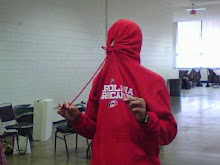Well, they looked good on paper. On paper. ON PAPER.
Why didn't it translate to the ice? Why is this team flirting with last place? How could all of those journalists and prognosticators get it so wrong?
The problem is, paper doesn't always show some of the most important factors that affect a team. I'm no expert and I'm not going to pretend I know what has caused Carolina or any other team's fall from grace, but here are a few factors that don't always show up on the roster or stat sheet:
1) Injuries. I'm not talking about players on injured reserve or even day-to-day. I'm talking about players who continue to play with nagging injuries. Often there is speculation that a player may be playing through an injury because he doesn't want to be on the shelf and let his team down. Add that to the extreme secrecy teams have over injuries and speculation runs amuck. Everything may seem fine and dandy since your favorite player is dressed every night and hitting the ice, but maybe his body isn't holding up as well as you'd think.
2) Potential vs. Reality. Chad LaRose finished with 19 goals last season and seemed to be emerging as a top 6 forward. So he must be poised for more this season, right? Not necessarily. Projecting the future of a player, even by one season can be a tricky business. Many a player has been given a bloated contract or bumped up to a higher line due to a breakout season, but this happens all the time. A player has a great year that stands out as a fluke, or to borrow a phrase "a player playing his best hockey." Maybe last year's Hurricanes were a collection of decent players playing great hockey and not great players playing to their expected ability.
3) Age. We get so used to hearing a name and expecting a result. I hear "John Doe" and I expect a better than 50% face-off percentage, 20+ goals, and 40+ assists. Then, all of a sudden, he produces less than that. I look at his birthday and he was born when Nixon was in office, yikes. But what about guys like Ray Whitney or Keith Tkachuk? They're getting up there in age and still playing some strong hockey. The problem is it's impossible to know when a player will taper off, how rapidly it will happen, and whether he can adjust to his new role. I like to use Mike Modano as an example of a guy who transitioned beautifully from being the go-to-guy for Dallas to being a strong depth player. For other guys who don't have as complete a skill-set, when the hands go they have nothing else to offer. It's like trying to predict when bread will go bad. Sometimes you get a loaf that stays good for a freakishly long amount of time, and sometimes you wake up to a science experiment on your counter.
4) System. Teams with successful systems reflect it in the standings. When all of the pieces are pulling in the same direction a team is more likely to execute a game-plan. Gretzky was often accused of coaching the Coyotes without a system. Whether or not this is true, they certainly played as though they didn't have one. Super-Mustache Dave Tippett, a man with a very defined system, takes over and suddenly the Coyotes are playing above their predicted ability. And much like my next point, you can have a great group of players but without a successful system it doesn't mean a thing.
5) Chemistry. You can have a great group of players but without chemistry it doesn't mean a thing. It's the "Dream Team" concept. Sometimes the best team isn't necessarily a collection of star players, but a collection of players who play well together. Maybe Erik Cole is a mediocre winger without Eric Staal centering him, but while they're playing together they're clicking. Jarome Iginla and Olli Jokinen may both be top level talent, but they just can't seem to gel for some reason. And no one can discount the value of chemistry when looking at LA's line of Kopitar, Smyth, and Williams. 41 points for the trio through 10 games played? That's chemistry.
Unfortunately, there is no stat to show chemistry. Nor is there a value you can assign to a system, or a way to project potential or age's affect on a player. If there were, maybe "on paper" predictions would more accurately show how a team would perform in a given season.
Then again, where's the fun in that? There would be no surprises, no upsets, no underdogs, and no tragedies. It would do away with the constant underestimation of teams like my Hurricanes. So go ahead 'Canes, stink it up out there, because we all know that Carolina doesn't show up until you count them out.


